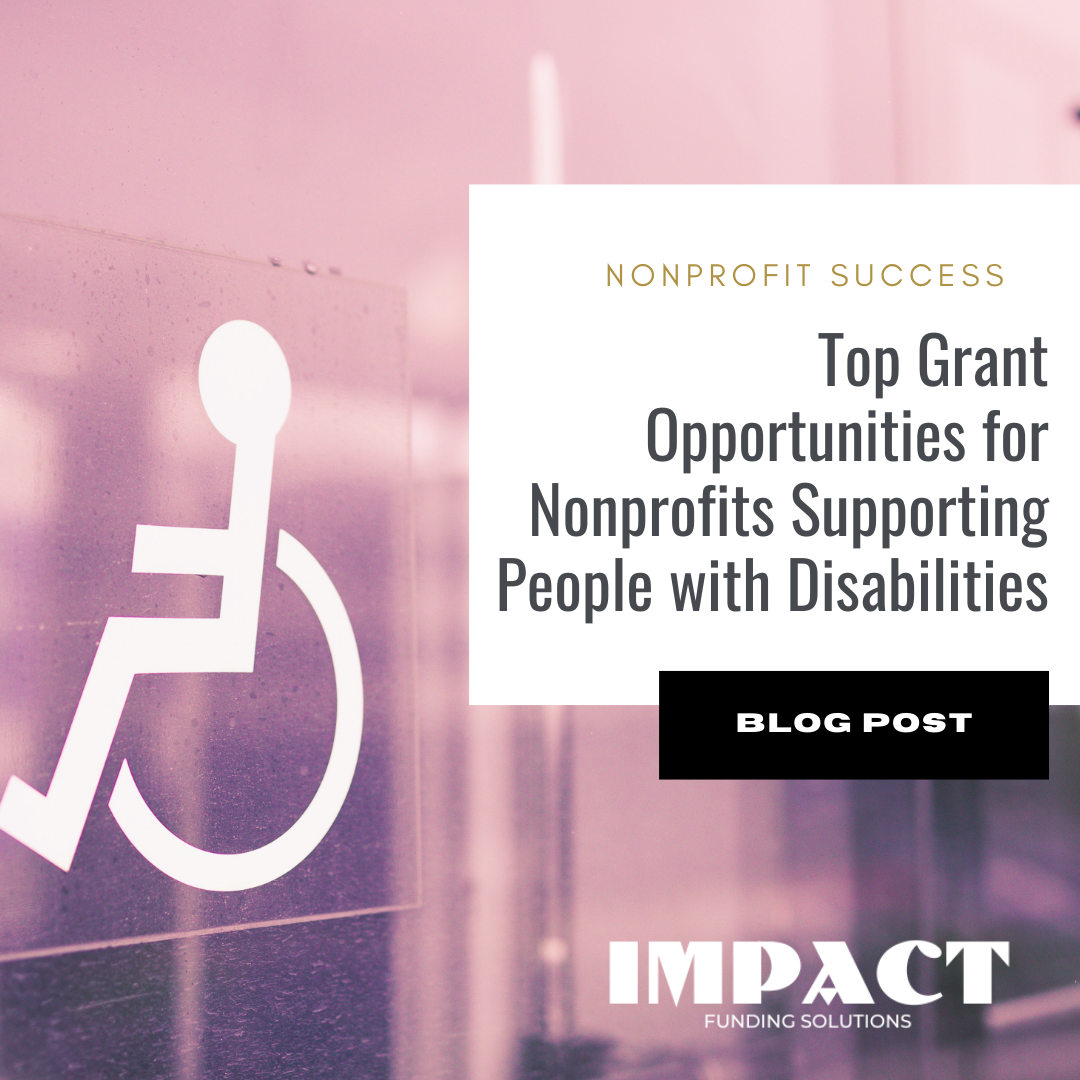Top Grant Opportunities for Nonprofits Supporting People with Disabilities

Top Grant Opportunities for Nonprofits Supporting People with Disabilities
Nonprofits that serve individuals with disabilities play a vital role in promoting accessibility, inclusion, and empowerment for some of our most underserved communities. Whether providing education, healthcare, employment support, or community programs, these organizations often rely on grants to fund their critical work. The good news is that there are many grant opportunities specifically designed to support nonprofits working with individuals with physical and intellectual disabilities. In this blog, we’ll highlight some of the top grants available, along with tips to help your organization secure the funding it needs to make a lasting impact.
WHAT CHALLENGES DOES YOUR NONPROFIT FACE?
Nonprofits serving individuals with disabilities often encounter unique challenges that require tailored strategies and innovative solutions. Here are some of the key challenges they face:
1. Funding Limitations
- Restricted Funding Opportunities: While there are grants specifically for disability-related programs, they often come with stringent eligibility criteria, making it harder for nonprofits to qualify.
- Higher Operating Costs: Programs for individuals with disabilities often require specialized equipment, facilities, and staff training, which can significantly increase expenses.
2. Accessibility Requirements
- Inclusive Services: Ensuring programs, events, and facilities are accessible to all, including those with physical, intellectual, or sensory disabilities, can be resource-intensive.
- Technology Needs: Digital platforms and websites must meet accessibility standards (e.g., WCAG compliance), adding another layer of complexity and cost.
3. Advocacy and Awareness
- Stigma and Misunderstanding: Nonprofits often need to address societal stigma and lack of understanding about disabilities, which can impact funding, community support, and program participation.
- Education: Advocacy efforts to educate the public, stakeholders, and policymakers about disability issues require consistent effort and resources.
4. Specialized Staffing and Training
- Qualified Personnel: Hiring staff with expertise in working with individuals with disabilities can be challenging, especially in rural or underserved areas.
- Ongoing Training: Staff and volunteers need regular training on accessibility, inclusion, and person-centered approaches, which can be time-consuming and costly.
5. Program Design and Delivery
- Customized Programs: Developing programs that address the diverse needs of individuals with different types of disabilities requires significant planning and resources.
- Transportation Barriers: Clients may face challenges in accessing services due to lack of accessible transportation, requiring nonprofits to provide additional solutions.
6. Data Collection and Reporting
- Measuring Impact: Collecting data to demonstrate program effectiveness can be difficult, especially when working with clients who may require alternative communication methods.
- Complex Reporting Requirements: Many grants for disability-focused programs require detailed reporting, which can strain staff capacity.
7. Building Sustainable Partnerships
- Collaboration Challenges: Partnering with other organizations, schools, or employers often requires overcoming logistical and cultural barriers to ensure inclusive practices.
- Long-Term Support: Establishing partnerships that lead to sustainable impact, such as inclusive employment opportunities, can take significant time and effort.
8. Navigating Policy and Legal Frameworks
- Compliance Requirements: Nonprofits must stay up-to-date on laws like the Americans with Disabilities Act (ADA) and ensure compliance in their operations and programs.
- Advocacy for Policy Change: Many nonprofits take on the additional role of advocating for systemic changes to improve the lives of individuals with disabilities.
9. Limited Representation
- Leadership Diversity: Nonprofits may face challenges in ensuring leadership and decision-making roles include individuals with disabilities to accurately represent the communities they serve.
By addressing these challenges with strategic planning, advocacy, and collaboration, nonprofits can continue to make a meaningful impact on the lives of individuals with disabilities while fostering a more inclusive and equitable society.
GRANTS FOR NONPROFITS SERVING PEOPLE WITH A DISABILITY
At Impact Funding Solutions, we are dedicated to assisting nonprofits that serve individuals with disabilities in securing the funding necessary to continue their vital work. Our team specializes in identifying and applying for grants tailored to support organizations like yours. Below is a curated list of grant opportunities specifically focused on nonprofits serving people with physical and intellectual disabilities:
-
Kessler Foundation Grants
- Description: Provides funding for programs targeting employment and other disability issues identified by the Foundation and collaborating agencies.
- Eligibility: Nonprofit organizations implementing innovative solutions to improve employment opportunities and career advancement for individuals with disabilities.
- More Information: Kessler Foundation Grant Programs
-
Mitsubishi Electric America Foundation (MEAF) Grants
- Description: Supports innovative strategies to empower youth with disabilities to lead productive lives through increased employment.
- Eligibility: Nonprofits focusing on projects that help youth with disabilities develop leadership and employment skills.
- More Information: Mitsubishi Electric America Foundation
-
People With Disabilities Foundation (PWDF) Grants
- Description: Provides grants to other nonprofit agencies in their work to integrate people with psychiatric and/or developmental disabilities into society.
- Eligibility: Nonprofits offering advocacy, education, vocational, or other impactful services to individuals with psychiatric and/or developmental disabilities.
- More Information: PWDF Grant Programs
-
Christopher & Dana Reeve Foundation Quality of Life Grants
- Description: Awards grants to nonprofit organizations that impact and empower people living with paralysis.
- Eligibility: Nonprofits that provide services to individuals living with paralysis, with a focus on programs that foster inclusion, involvement, and community engagement.
- More Information: Reeve Foundation Grants for Non-Profits
-
Ability Central Grants
- Description: Offers grants typically ranging from $500 to $15,000 to programs focused on communication and information access for individuals with disabilities.
- Eligibility: Nonprofits working on projects that improve communication and information access for people with disabilities.
- More Information: Ability Central – Other Disability Funders
At Impact Funding Solutions, we have extensive experience collaborating with nonprofits and social enterprises dedicated to serving individuals with both physical and neurodiverse disabilities. Our founder’s personal connection—her husband has a physical disability—deepens our commitment and understanding of the unique challenges these organizations face. This personal insight drives our passion to secure the necessary funding to enhance accessibility, inclusion, and empowerment for all.
Top Grant Opportunities for Nonprofits Supporting People with Disabilities – We Can Help!
If your organization is seeking assistance in navigating the complex landscape of grant funding, we are here to help. Our expertise in grant research, strategy development, and application processes can support your mission to make a meaningful impact in the lives of individuals with disabilities. CONTACT US TODAY for a free discovery call!

